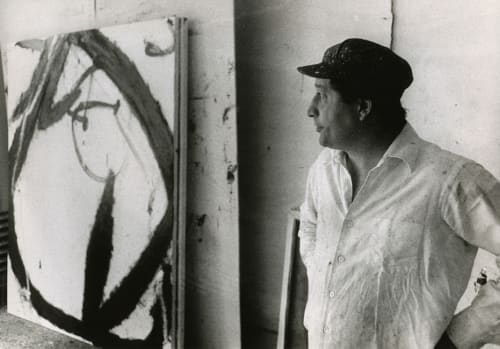Norman Bluhm (American, 1921-1999) embraced abstraction and propelled it forward, blending figurative elements, eroticism and calligraphic agility to arrive at a sensibility all his own. Bluhm's work was informed less by movements and orthodoxies than by his own exceptional biography and his rich knowledge of, and respect for, the history of art. He was able to move his art forward while being a stalwart steward of its past. Bluhm was justifiably secure enough in his talent and training to honor Europe and the history of art without compromising his identity as an American painter.
Born in Chicago's South Side Bluhm initially studied the Bauhaus approach to architecture while also spending his spare time learning to fly. After the attack on Pearl Harbor during World War II, Bluhm became a B-Pilot and flew 44 missions over North Africa and Europe before getting wounded and sent home. After the war he decided to discard his career as an architect and moved to Paris where he attended art classes at the Académie de la Grande Chaumiére and Ecole des Beaux Arts. In 1956 he returned to New York and began a lifelong successful career as an Abstract Expressionist painter. He was part of a vibrant and glamorous "movement", socializing with a handful of art-world titans and collaborating with the curator and poet Frank O'Hara to create a legendary collection of "Poem Paintings." An important figure in the heyday of Abstract Expressionism, Bluhm enjoyed substantial critical success during his lifetime. His work is included in the collections of the Metropolitan Museum of Art, the Whitney and the Museum of Modern Art. However, he found greater solace in painting than in fame or academic theorizing about art. Gradually he moved farther and farther from New York, eventually settling in a still corner of Rural Vermont. Bluhm was enthralled with painting itself not fame or public relations. For him the studio was the center of the art universe and whether in Paris, New York, or Vermont he allowed himself to be led by its constant demands. Norman Bluhm died at his home in East Wallingford, Vermont on February 3, 1999.
